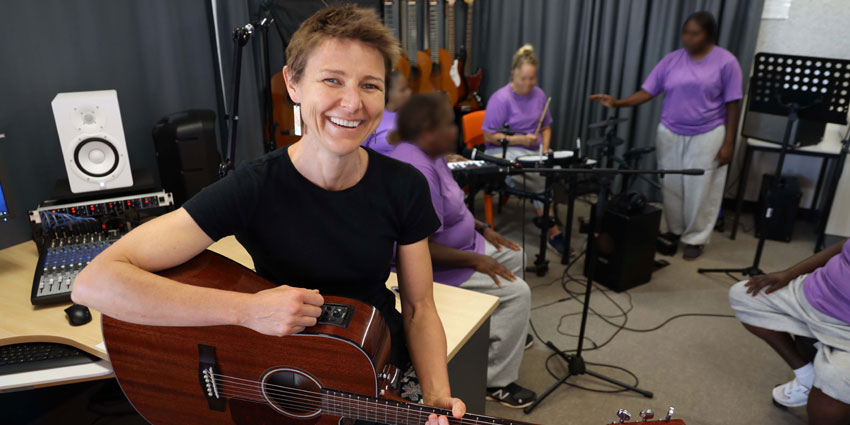
Prisoner Education Coordinator Ange Leech at Eastern Goldfields Regional Prison’s music studio.
Jim Moginie mixed and mastered the recording of The Dead Heart, along with five original songs by the women at Eastern Goldfields Regional Prison (EGRP), sung mostly in the Ngaanyatjarra language of the Western Desert.
The tracks have been captured on an album called Minymaku Kurturtukatja - Heart of a Woman in which the women tell stories of homeland, family, forgiveness and love.
The recordings emerged from a Department of Justice education program designed by staff and prisoners at EGRP for Ngaanyatjarra speakers to gain literacy skills in the language through creative writing.
The course empowered the women – who were mostly untrained in music - to explore and write about their experiences and emotions, forming songs and translating them into Ngaanyatjarra - including the lyrics of The Dead Heart.
Commissioner for Corrective Services Mike Reynolds said engaging prisoners in music and education programs contributed significantly to their rehabilitation and reintegration.
"In addition to personal development, this innovative program gives participants valuable language and translating skills which they could put to use in the community," Commissioner Reynolds said.
The vocals were recorded at EGRP's education facility and sent to Moginie's Sydney studio, where the Oils founding member added instrument tracks with acclaimed jazz drummer Hamish Stuart.
Midnight Oil guitarist Jim Moginie (Sarah Lorien Photography)
Moginie said when the prison's project facilitator floated the idea of recording a Midnight Oil song he suggested The Dead Heart because of the Aboriginal perspective of its lyrics. It's the first Indigenous-language cover of one of the band's songs that he's heard.
"When the version came through, I was completely blown away," he said. "I couldn't believe how beautiful it was and how stripped back it was and so rhythmically great." The other members of Midnight Oil shared the same sentiments when he sent it to them.
Moginie was also taken with the original songs the women recorded. "The performances are so heartfelt. These are songs of real longing and real pain. This stuff's just so raw at times. It's quite confronting, actually.
"I'm constantly working on other people's records, but this one just holds a real place in my heart because it's just so beautifully expressed and whatever they did there in the prison was extraordinary."
The four women dedicated their efforts to children, family and yearning for home. "It makes them more strong and confident, so they can keep going," one said about her fellow participants.
Project facilitator Ange Leech said: "It was incredibly moving to see the strength and commitment that women invested in this course and writing these songs.
"We've always made programs that students want to participate in, and do everything we can to give them the best chance of success when they leave," Ms Leech, a Prisoner Education Coordinator, said.
This is the third album recorded by EGRP prisoners and the second involving Moginie, following Wangka Kutjarra: Two Languages recorded by male performers in 2018.
CDs of the album are available at the Fremantle Prison Gift Shop or by emailing art@justice.wa.gov.au



